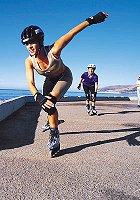When was the last time you took a day off from training? If you have to go
back months in time to find a blank entry in your training log, you may not only
have to worry consider about the possibility of overtraining your body, but
perhaps you also have an addiction to exercise.
 The
numerous positive effects of exercise are no secret to anyone. Regular exercise
helps provide long-term protection against coronary heart disease, hypertension,
cancers, diabetes and osteoporosis. The American College of Sports Medicine
(ACSM) recommends adults do 30 minutes or more of moderate intensity physical
activity on most, preferably all, days of the week. The psychological benefits
of exercise may even surpass physiological benefits: enhancing mood and
improving psychological functioning, reducing anxiety, depression, stress and
tension, improving self-esteem and self-perception and may even show benefits
for those experiencing pms. It is also believed that aerobic exercise is better
than anaerobic in terms of its positive effects.
The
numerous positive effects of exercise are no secret to anyone. Regular exercise
helps provide long-term protection against coronary heart disease, hypertension,
cancers, diabetes and osteoporosis. The American College of Sports Medicine
(ACSM) recommends adults do 30 minutes or more of moderate intensity physical
activity on most, preferably all, days of the week. The psychological benefits
of exercise may even surpass physiological benefits: enhancing mood and
improving psychological functioning, reducing anxiety, depression, stress and
tension, improving self-esteem and self-perception and may even show benefits
for those experiencing pms. It is also believed that aerobic exercise is better
than anaerobic in terms of its positive effects.
So if you are going to be addicted to something, it might as well be
exercise, right? Think again! Exercise addiction is thought to share
similarities with other addictions, perhaps the most common being the unpleasant
affects of withdrawal. The mood enhancing and analgesic properties associated
with exercise are influenced by chemicals in the brain which are akin to opiates
(endorphins).
Exercise addiction may be based on psychological factors (personality) and
physiological mechanisms (endorphin dependence) or an interplay between the two.
However, there is a danger of confusing exercise adherence with exercise
dependence and exercise addiction. Exercise addiction is not necessarily
restricted to high-level athletes. Take this quiz and find out if you should
join the Exercisers Addicts Anonymous chapter nearest you.
Exercise Survey
 The
numerous positive effects of exercise are no secret to anyone. Regular exercise
helps provide long-term protection against coronary heart disease, hypertension,
cancers, diabetes and osteoporosis. The American College of Sports Medicine
(ACSM) recommends adults do 30 minutes or more of moderate intensity physical
activity on most, preferably all, days of the week. The psychological benefits
of exercise may even surpass physiological benefits: enhancing mood and
improving psychological functioning, reducing anxiety, depression, stress and
tension, improving self-esteem and self-perception and may even show benefits
for those experiencing pms. It is also believed that aerobic exercise is better
than anaerobic in terms of its positive effects.
The
numerous positive effects of exercise are no secret to anyone. Regular exercise
helps provide long-term protection against coronary heart disease, hypertension,
cancers, diabetes and osteoporosis. The American College of Sports Medicine
(ACSM) recommends adults do 30 minutes or more of moderate intensity physical
activity on most, preferably all, days of the week. The psychological benefits
of exercise may even surpass physiological benefits: enhancing mood and
improving psychological functioning, reducing anxiety, depression, stress and
tension, improving self-esteem and self-perception and may even show benefits
for those experiencing pms. It is also believed that aerobic exercise is better
than anaerobic in terms of its positive effects.